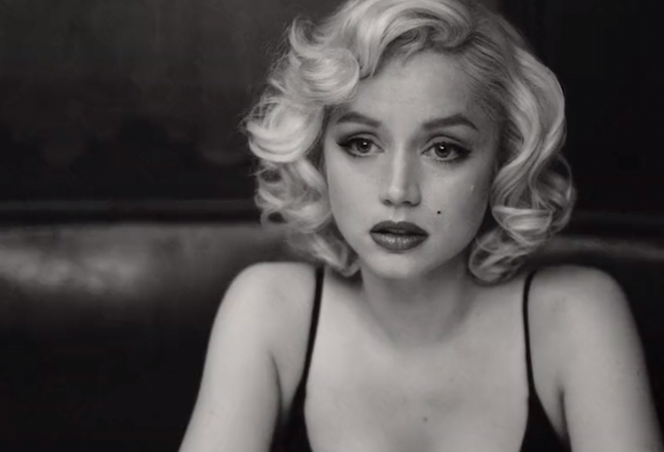
Despite only being a teaser, the first promotional material for Blonde appears to succinctly summarise the film’s plot: being Marilyn Monroe took a huge toll on Marilyn Monroe.
In it, Monroe (played by Ana De Armas) sits in front of a dresser, crying. “Don’t abandon me,” she whispers, her words a prayer, before her make-up artist responds: “She’s coming.”
Forty-two seconds in, and we realise who “she” is. Monroe herself. In character, De Armas blinks away her tears, stares down her reflection, and transforms from her tortured self into Hollywood’s most famous “blonde bombshell”.
The recently released trailer for Andrew Dominik’s forthcoming film Blonde extends the tragedy of Monroe’s life by another minute, as we see De Armas’s Monroe tell her one-time husband Joe DiMaggio (Bobby Cannavale) that “Marilyn doesn’t exist”.
The trailer has sparked criticism, with fans calling it “an exploitation film masquerading” as a biography.
However, the film is based on Joyce Carol Oates’ eponymously titled fiction novel, and appears to touch on an important facet of Monroe’s career: that she faked it until she made it, and was very aware of portraying a character in public. It’s a particular phenomenon that’s even been dubbed “The Marilyn Monroe Effect”.
The phrase has been credited to Amy Greene, the wife of Monroe’s personal photographer Milton Greene.

As published in The Psych Central, the story goes something like this: Greene and Monroe were “walking around New York City, just having a stroll on a nice day”.
Greene said that Monroe “loved New York because no one bothered her there like they did in Hollywood, [so] she could put on her plain-Jane clothes and no one would notice her”.
He continued: “So, as we we’re walking down Broadway, she turns to me and says, ‘Do you want to see me become her?’ I didn’t know what she meant but I just said ‘Yes’ – and then I saw it.
“I don’t know how to explain what she did because it was so very subtle, but she turned something on within herself that was almost like magic. Suddenly cars were slowing, and people were turning their heads and stopping to stare.
“They were recognising that this was Marilyn Monroe as if she pulled off a mask or something, even though a second ago nobody noticed her. I had never seen anything like it.”
This phenomenon is now called “The Marilyn Monroe Effect”.
It makes the case that, despite leading a tumultous life, Monroe was able to transform into the legendary Hollywood star at will – compelling those around her to see her in the same light.
However, as the trailer for Blonde depicts, the greatest tragedy of Monroe’s life was that she was “watched by all” but “seen by none”.
Blonde is released on Netflix on 28 September.







